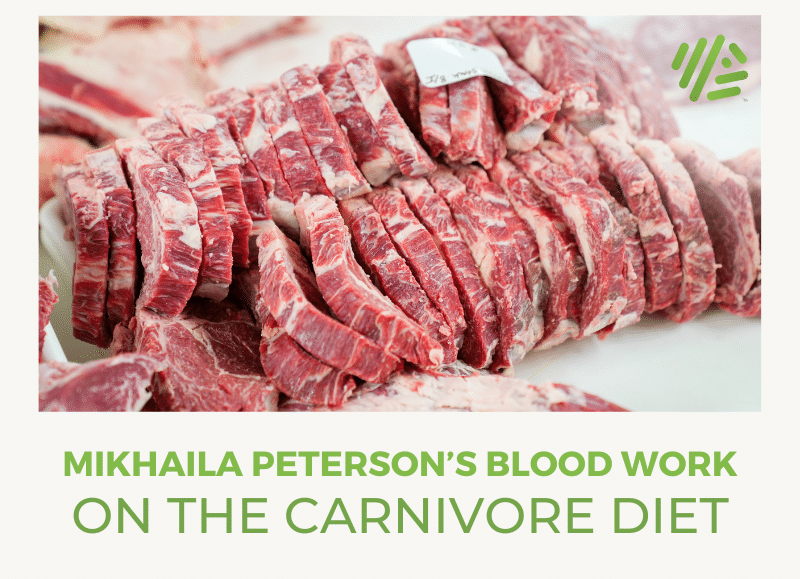Mikhaila Peterson’s Blood Work on the Carnivore Diet
Article at a Glance
- The all meat carnivore diet has been met with controversy, and is likely unhealthy for most people.
- However, new studies show that a high fat low carbohydrate diet affects blood lipid levels differently in different people.
- People who clear large amounts of LDL particle due to favorable PCSK9 genes may do better on a carnivore diet.
- Mikhaila Peterson, a well known carnivore dieter, published blood work recently which proves she’s in good health on a carnivore diet. The reaction to the diet likely varies considerably based on the individual.

Contents
Steak for every meal, everyday. That’s the carnivore diet in a nutshell, and it’s growing in popularity.
Unhealthy right?
Yes.
We’ve written previously about the Carnivore Diet and why we think it’s an unhealthy regimen for most people, let alone terrible for the environment and climate change.
But this blog is not tied to any one theory of nutrition, instead we recognize that different people respond very differently to certain diets.
One of the most famous carnivore dieters, Mikhaila Peterson, published her blood work (the results have since been taken down since this post was written) after eating nothing but beef and beef fat for months, and the results were interesting.
Her numbers look fantastic.
Her LDL-P is 684!
LDL-C is 67.
Triglycerides 41.
Total cholesterol 133.
Lp(a) – 6 nmol/L
HbA1c – 5.2
When you view her results, you may say the small LDL-P is a little high, but as Dr. Peter Attia has pointed out, “once adjusted for particle number, particle size has no statistically significant relationship to cardiovascular risk.”
If you look at Framingham percentiles, Mikhaila is in the 98th percentile based on LDL-P and LDL-C eating nothing but beef, which is crazy (assuming the numbers are accurate).

Get Started With Personalized Nutrition
Gene Food uses a proprietary algorithm to divide people into one of twenty diet types based on genetics. We score for cholesterol and sterol hyperabsorption, MTHFR status, histamine clearance, carbohydrate tolerance, and more. Where do you fit?
Does This Mean We All Should Be on the Carnivore Diet?
No.
And this is where we part company with Mikhaila. I definitely don’t believe all plants are unhealthy, even ones that are higher in lectin. I think each individual has to map out a path for nutritional success, and no two will look exactly alike. At the end of the day, this is the philosophy behind our custom nutrition plan.
It is clear that the carnivore diet is healthy for Mikhaila, at least in the short term, but that does not mean it will be healthy for people with different genetic compositions.
I still think advocating for the carnivore diet is tricky because many people will have bad outcomes across a number of different biomarkers. For example, uric acid, a biomarker I wrote about last week. Presumably, there is a large group of people who will develop gout on such a high purine diet.
Why is Mikhaila’s LDL-P so low on an all beef diet?
I don’t know, but I have a few hunches.
We have reached out to Mikhaila to offer her a free genetic analysis, and hopefully she will take us up on that offer one of these days, but in the meantime, if I had to guess why her LDL-P is so low, I would say that she is one of the lucky ones who has decreased PCSK9 activity, which leads to greater clearance of LDL particles through her liver.1 Keep in mind that the liver not only produces lipoproteins to traffic fats and phospholipids, it also clears these particles from the blood stream through the LDL receptors. The scientist who discovered the LDL receptor won a Nobel Prize.
PCSK9 is a gene that has been targeted by a number of different drugs. When the major variant of the gene is present and PCSK9 activity is elevated, it acts almost as a “PacMan” that eats LDL receptors which has the effect of keeping the particle count higher. Some people have PCSK9 genes that show a decrease in activity, and in these people the LDL receptor count stays higher, which leads to greater clearance and lower LDL-P.1
The number one risk factor for heart disease is elevated LDL-P because it is these APOB lipoproteins that delivers cholesterol / plant sterol to the artery wall where there immune system then attacks the invader, causing inflammation and ultimately heart disease.
This is why lipid experts like Dr. Attia sum up lowering heart diseased risk by simply saying: lower particle count if you want to focus on one rule. PCSK9 is an important pathway if you want to lower LDL-P.
The Role of Plant Sterol in LDL Labs
Another guess as to why Mikhaila’s blood work looks so good could have something to do with sterols. It’s possible some who do really well on a carnivore diet have undiagnosed sitosterolemia, and in these people perhaps the LDL-C numbers are mostly comprised of phospholipids?
Removing the plant sterol lowers the LDL-C dramatically.
I credit lipid expert Tom Dayspring for turning us on to the fact that LDL-C assays measuring LDL-C are not just measuring the weight of the cholesterol within the LDL particle, they also measure the phospholipid cargo. Now, as I have written previously, there is a plausible genetic explanation for why some, like Mikhaila, thrive on a carnivore diet, and I believe it is tied to sterol absorption. Many of the symptoms Mikhaila has written about previous (crippling joint pain, fatty deposits in and around joints) are consistent with sitosterolemia, a condition marked by the hyper absorption of plant sterol.
Perhaps people like Mikhaila absorb plant sterol at an elevated rate and those phospholipids then form the bulk of the LDL-C mass in labs.
When they are removed, her body actually does a much better job with animal fats than it did with plant fats?
The Retterstol Study
An LCHF diet for 3 wks increased LDL-C 44% vs controls (same with apoB). The individual response on LCHF varied profoundly. This unpredictable metabolic stress suggests that In clinical practice LDL-C should be measured in people using a LCHF diet. https://t.co/jlAwHU8jFj
— Thomas Dayspring (@Drlipid) December 11, 2018
We have written about the Retterstol study before and Dr. Dayspring does a nice job of summarizing findings in the tweet I included above. He takes things a step further saying that we should measure LDL-C using a low carb, high fat diet. Through her carnivore diet experience, Mikhaila accidentally did just that.
In the Retterstol study, the increase in LDL-C varied between 5% and 107% on a low carb high fat diet. It’s an important study because it demonstrates that there are tremendous genetic differences between people when it comes to how they deal with different nutritional inputs.
It’s the genetic differences between us that dictate success on various diets.
There is no one size fits all solution.
The Bottom Line
Brass tax: many people are not genetically suited to dealing with the metabolic waste produced by the heavy load of animal protein eaten on a carnivore diet.
For example, changes in the urea cycle or uric acid genes could put a heavy burden on some individuals who go on a carnivore diet. Their systems simply are not equipped to deal with that much ammonia / urea, which could take a toll on the liver and kidneys.
And that doesn’t touch on the problem of lipids, which in some individuals with lower LDL receptor activity due to genes like PCSK9, could reach dangerous levels on a diet that high in saturated fat. Then you have Valter Longo’s research about the inflammatory nature of amino acids like methionine, which in the high doses seen on an all beef diet could push IGF-1 levels to an unhealthy place.
But those are all theories, and there are exceptions to every rule.
Kudos to Mikhaila for finding a diet that works for her.

Gerald Dropped His LDL-C by 100 Points With Diet Alone
Gerald was an ultramarathon runner, but despite his dedication to fitness, he was struggling with rising cholesterol levels, increasing blood pressure, and low energy.




A lot of people are trying it, me included, and saying it works. So far, so good.
I was pre-diabetic a year ago, lost 42 pounds so far with great blood work. Saw my doctor last month. I noticed he had put on a lot of weight and was having trouble breathing. I gently poked his tummy and said you need to do what I did, eat meat, forget everything else. He said you’re right, I need to do something. As we were shaking hands saying our goodbyes, he said “You son of a gun, you look 50.” I’m 72.
Awesome story! False beliefs are so hard to overcome and that’s no different whether it be false religious beliefs or false medical beliefs. Something about being human makes us very very attached to our beliefs and very reluctant to look at the evidence that contradicts our beliefs. Hopefully your doctor will try it.